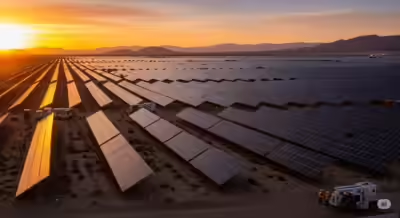Bahrain has embarked on a significant step towards a sustainable energy future with the announcement of its first major utility-scale solar power project. The 150 megawatt (MW) solar facility, located in the southern region near Bilaj Al Jazayer, is set to generate enough electricity to power over 6,000 homes upon its expected completion in the third quarter of 2027.
Project Overview
Location and Scale
Spanning approximately 1.2 square kilometers, the solar plant will harness the abundant sunlight in southern Bahrain to produce clean, renewable energy. This strategic location ensures optimal sunlight exposure, maximizing energy generation efficiency.
Timeline and Development
The Electricity and Water Authority (EWA) of Bahrain has initiated a global market sounding exercise to engage local and international developers. A competitive tender process is scheduled for September 2025, with commercial operations anticipated to commence in the third quarter of 2027.
Advisory and Partnerships
To ensure the project’s success, EWA has enlisted a consortium of experienced advisors:
- KPMG Fakhro: Financial Advisor
- WSP Parsons Brinckerhoff: Technical Advisor
- Trowers & Hamlins: Legal Advisor
These partnerships aim to provide expert guidance throughout the project’s development, ensuring adherence to international standards and best practices.
Strategic Importance
Advancing Renewable Energy Goals
This solar project is a cornerstone in Bahrain’s National Renewable Energy Plan, which targets increasing the share of renewable energy in the national energy mix to 20% by 2035. By contributing 150 MW of clean energy, the project significantly advances the Kingdom’s commitment to sustainable energy development.
Environmental Impact
The solar plant is expected to offset over 100,000 tons of carbon dioxide emissions annually, aligning with Bahrain’s long-term goal of achieving net-zero carbon emissions by 2060. This reduction in greenhouse gas emissions underscores Bahrain’s dedication to combating climate change and promoting environmental stewardship.
Energy Security and Economic Diversification
By diversifying its energy sources, Bahrain enhances its energy security, reducing dependence on imported fossil fuels. The project also supports economic diversification by fostering the growth of the renewable energy sector, creating job opportunities, and attracting investment in green technologies.
Community and Economic Benefits
Powering Homes and Communities
The solar facility’s capacity to supply electricity to over 6,000 homes will directly benefit Bahraini households, providing them with a reliable and sustainable energy source. This initiative not only meets the growing energy demand but also improves the quality of life for residents by ensuring consistent power supply.
Job Creation and Skill Development
The development and operation of the solar plant are expected to generate numerous employment opportunities in various sectors, including construction, engineering, and renewable energy technologies. Additionally, the project will facilitate skill development and capacity building, equipping the local workforce with expertise in the burgeoning renewable energy industry.
Stimulating Private Sector Investment
The public-private partnership model adopted for this project aims to stimulate private sector involvement in Bahrain’s renewable energy sector. By creating a conducive environment for investment, the project sets a precedent for future collaborations, encouraging innovation and competition in the green energy market.

Technological Innovations
Advanced Photovoltaic Systems
The solar plant will incorporate state-of-the-art photovoltaic (PV) technologies to maximize energy conversion efficiency. These advanced systems are designed to withstand Bahrain’s climatic conditions, ensuring long-term reliability and performance.
Smart Grid Integration
To enhance grid stability and optimize energy distribution, the solar facility will be integrated into Bahrain’s smart grid infrastructure. This integration allows for real-time monitoring and management of energy flow, facilitating efficient utilization of generated power and minimizing transmission losses.
Future Prospects
Scaling Up Renewable Energy Initiatives
Building on the success of the 150 MW solar project, Bahrain plans to expand its renewable energy initiatives, exploring other sources such as wind and waste-to-energy technologies. These efforts aim to further diversify the energy mix and increase the share of renewables in the national grid.
Regional Leadership in Clean Energy
With this landmark project, Bahrain positions itself as a regional leader in clean energy development. The country’s proactive approach serves as a model for other nations in the Middle East and North Africa (MENA) region, demonstrating the feasibility and benefits of large-scale renewable energy projects.
Conclusion
Bahrain’s 150 MW solar power project marks a pivotal moment in the nation’s journey towards a sustainable and diversified energy future. By embracing renewable energy, Bahrain not only addresses its current energy needs but also sets a course for long-term environmental and economic resilience. The project’s successful implementation will undoubtedly inspire further advancements in the Kingdom’s renewable energy landscape, contributing to a cleaner, greener future for all.
Do follow us: Instagram
Read More: BMTC Employees to Represent India at Qatar International Kabaddi Championship 2025



